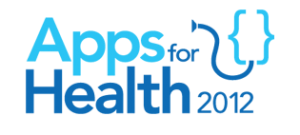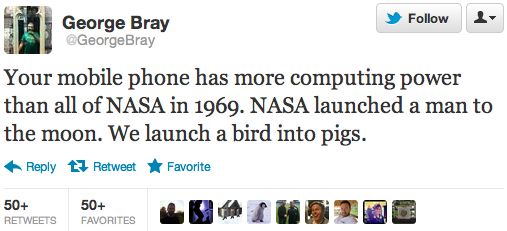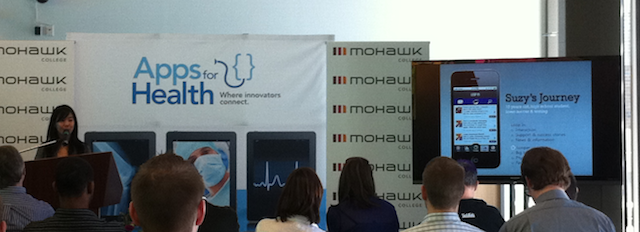AppsForHealth helps build Ontario’s eHealth community
 Over the last two days I attended Mohawk College’s AppsForHealth conference. The two day conference first took place last year, with the second occurring May 10-11th of 2012. The first day of the conference was centered around talks, discussion panels, technology showcases and networking for professionals and students alike. The second day of the conference was centered around a student mHealth app design competition where teams of students attempt to design mobile solutions to health care challenges posed by industry sponsors. I was part of the UI design panel that took place during the first day of the conference. The diversity of the community at the event in terms of career backgrounds made for lively and interesting discussions, as nursing students, med school students, family doctors, policy makers and entrepreneurs in the audience connected with a diverse mix of UX and UI design experience on the panel. At one point the following Tweet was briefly brought up on the screen:
Over the last two days I attended Mohawk College’s AppsForHealth conference. The two day conference first took place last year, with the second occurring May 10-11th of 2012. The first day of the conference was centered around talks, discussion panels, technology showcases and networking for professionals and students alike. The second day of the conference was centered around a student mHealth app design competition where teams of students attempt to design mobile solutions to health care challenges posed by industry sponsors. I was part of the UI design panel that took place during the first day of the conference. The diversity of the community at the event in terms of career backgrounds made for lively and interesting discussions, as nursing students, med school students, family doctors, policy makers and entrepreneurs in the audience connected with a diverse mix of UX and UI design experience on the panel. At one point the following Tweet was briefly brought up on the screen:
It reminded me of articles I’ve come across over the last year like The Jig Is Up: Time to Get Past Facebook and Invent a New Future by Alexis Madrigal (@alexismadrigal) advocating for a new paradigm for startups, and Stop Building Apps and Start Disrupting Industries by Michael Karnjanaprakorn (@mikekarnj) encouraging startups to focus on disrupting industries such as education and healthcare.
I do love Angry Birds, but when I read articles like these and Tweet’s like the above, it makes me think about watching shows like Star Trek growing up, where technology was being used in the future to save lives and drastically improve quality of life. I remember Dr. McCoy thought our health care might as well be from the dark ages! Wherever they found their inspiration, I think that like health care professionals, a lot of engineers and scientists are motivated to do what they do by the possibility of improving people’s lives and creating a better future.
That’s why I’m excited about AppsForHealth and other events across Canada like Hacking Health in Montreal that are working towards increasing and improving the usage of technology in health care. The infrastructure for supporting eHealth and mHealth in terms of internet access, bandwidth and market penetration is now in place, and increasingly capable mobile devices are gaining larger market penetration with lower costs every year. There are great opportunities for using this new technology to improve health in Canada and around the world. And with rising health care costs squeezing government budgets to the point of credit downgrade warnings, technology may provide an alternative solution to the undesirable options of either decreasing services or increasing costs.
You can check out some video coverage of the first day of AppsForHealth here:
The student challenge portion of the event was focused on designing mHealth solutions to challenges posted by non-profit and health care organizations. Students formed teams with a mix of technical and medical skills in the weeks before the event, and were able to access professional mentors during the pre-event mixer and the event itself to improve their solutions. The top three prizes as awarded by the judges were $3000, $2000 and $1000 respectively. Check out the list of challenges below:
- World Vision Challenge – How might we use mobile technology to support growth monitoring and counselling for children under the age of 5 to improve nutrition and reduce child mortality in developing countries? [link]
- Electronic Dermatology Consultation – How can mobile technology be used to streamline dermatology consultations in the primary care setting? [link]
- Mobile Assistance Solution for Youth with Lupus – How could a mobile app increase connectedness with other young people with lupus; track symptoms; remind them to take their medications, include an up-to-date summary of their current status; allow communication of their health status to health care providers; and ide healthy role models in a way that is easy to access, empowering and fun and that won’t require individual feedback to users? [link]
- Interoperability Between Specialized Data and Generic EHR – How could nurses use technology in a long term care organization to plan, evaluate and document evidence-based care? How could technology enable safe transition of care at shift change? How could technology interoperate with the EHR to improve patient care and capture health outcome data? [link]
- Mobile Education App for Prostate Cancer – Design an application that will be used to educate men on prostate cancer and provide them with the relevant questions to ask their doctor, based on their profile and disease stage – screening, diagnosis, treatment, living with cancer or remission. [link]
- Technological Assistance for Children with Chronic Health Conditions – How can technology be used to improve accessibility and ease of use of the new WHO classification system (ICF-CY) to process, collect and display information about the ‘disability’ and ‘functional’ status of children with chronic health conditions? [link]
- Mobile Solution to Reduce Mortality Rates in Northern Haiti – How can we use mobile decision support and mobile technology to improve effective institutional delivery referrals to reduce maternal and infant mortality rates in rural communities in Northern Haiti? [link]
- Leveraging Technology to Assist Seniors with Alternative Living and Long-Term Care – How could mobile technology be used to assist seniors and their families explore and discuss alternate living environments and long-term care options? [link]
- Medical Records Challenge – How can a chronic disease patient track their relevant symptoms using an application, meanwhile utilizing the live data from this symptom tracker to trigger retrieval or receipt of research- based recommendations, and present those recommendations to both the patient in their PHR and to their health care providers’ EMR? [link]
The winners were announced at the close of the event on Friday afternoon:
Though I love that it takes place in Hamilton, it was clear during the event that AppsForHealth really has fast become Ontario’s conference for mHealth and eHealth professionals. The keynotes, panelists, experts, technology demonstrators, professionals and students came from Waterloo, London, Toronto, Hamilton and post-secondary institutions from all over Southern Ontario. AppsFoHealth is playing an important community building role for the region. It brings together a group of people with diverse talents and connects them to one another so that together they have the skills required to tackle these challenges. For me personally what I liked the most was being reminded about why I became interested in science and technology to begin with. And I think it was because the challenges themselves were so focused on ideas that would save lives, improve quality of life, and help create that better future for everyone. Organizers Christy Taberner, Duane Bender (@duane_bender) and Mark Casselman (@markcasselman) have put together something really great. I can’t wait to see AppsForHealth 2013.




